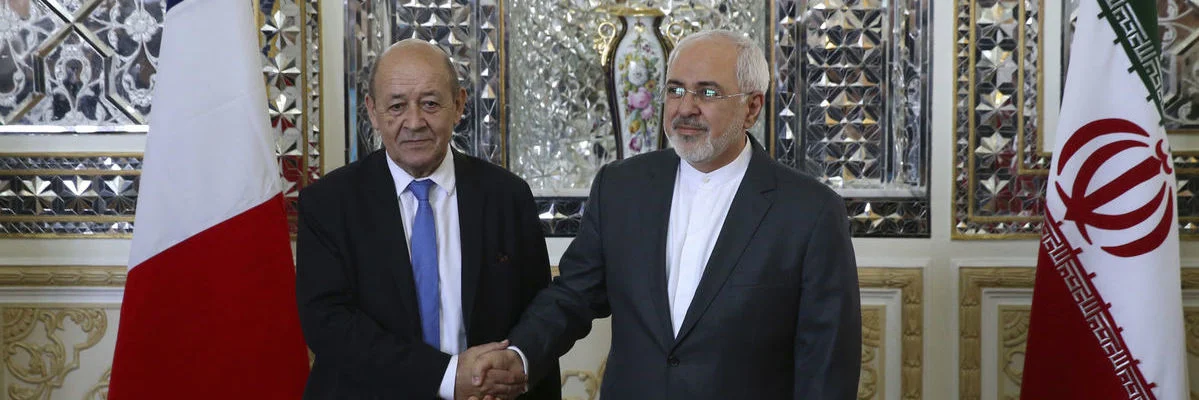French Foreign Minister in Tehran for Tense Talks
French Foreign Minister Jean-Yves Le Drian was in Tehran Monday to push for pledges on Iran's ballistic missile program in a bid to preserve the country's historic nuclear deal.
It is the first visit by one of the European parties to the 2015 nuclear accord since US President Donald Trump set an ultimatum that he would abandon it in May if it was not "improved".
Le Drian had promised a "frank dialogue" ahead of his arrival in Tehran early Monday, but faced an awkward reception given the anger generated by his comments on Iran's missile program and foreign policy.
"In order to keep the United States in the Iran nuclear deal, European countries are suffering from extremism and this will ultimately undermine Europe's policy," Foreign Minister Mohammad Javad Zarif told the reformist newspaper Etemad ahead of his meeting with Le Drian.
It followed the French minister's interview with the Journal du Dimanche a day earlier, in which he warned that Tehran was "exposing itself to new sanctions" if it did not rein in its missile programme.
Conservative media in Iran hit back on Monday, with daily Kayhan writing: "French foreign minister insults people of Iran before visit to Tehran." The Javan newspaper headlined its story: "Trump's Parisian lackey in Tehran."
Le Drian headed into talks with Zarif shortly after meeting with Ali Shamkhani, secretary of the Supreme Council of National Security and a close ally of supreme leader Ayatollah Ali Khamenei. There were no public statements or news conferences -- reflecting the
sensitive moment in which the countries find themselves.
'No emissary of Trump'
Trump in January set a 120-day deadline for US lawmakers and European allies to "fix" the nuclear deal, the top foreign policy achievement of his predecessor Barack Obama.
But Iran has refused to re-negotiate the deal or add extra clauses, arguing that the United States has failed to keep up its end of the bargain on the existing accord.
Keen to appease Trump and save the deal, European countries have voiced increasing concern over the missile program, which Iran says is purely defensive and not up for negotiation. Le Drian has said that without an end to ballistic missile tests by Iran, it will "always be suspected, with reason, of wanting to develop nuclear weapons."
Nonetheless, Le Drian's team were keen to emphasise he was no "emissary of Donald Trump" and firmly supported the 2015 deal. "We want to preserve the nuclear deal because it is working, it's robust and because the Iranians are respecting it," the team told AFP.
The International Atomic Energy Agency has repeatedly found Iran is abiding by its commitments, which curbs its nuclear programme in exchange for a lifting of crippling international sanctions. IAEA director general Yukiya Amano said on Monday that losing the nuclear deal "would be a great loss for nuclear verification and for multilateralism".
France's Re-Engagement
If the political track looks tricky, France is at least hoping that its cultural diplomacy can offer a more positive flavour to the trip with Le Drian due to inaugurate an "unprecedented" show of items from the Louvre in Paris at Tehran's National Museum.
"Relations between France and Iran are old and profound because France was a pioneer of archaeological exploration here," said Jean-Luc Martinez, president of the Louvre.
"This international exhibition allows us to make the link between this glorious moment and the relations dating back to the 19th century." Despite their differences, Iran has broadly welcomed France's re-engagement with the country.
Last year's $5 billion gas exploration deal with French energy giant Total was the biggest in Iran since the nuclear accord, and showed French companies were willing to stand up to pressure from Washington to avoid all business relations with the Islamic republic.
Le Drian is also expected to push Tehran to put pressure on its Syrian ally to end the devastating assault on Eastern Ghouta near Damascus.
In a phone call on Sunday, French President Emmanuel Macron urged his Iranian counterpart Hassan Rouhani to put the "necessary pressure" on the Syrian government to halt "indiscriminate" attacks in the rebel enclave.
Photo Credit: MFA




